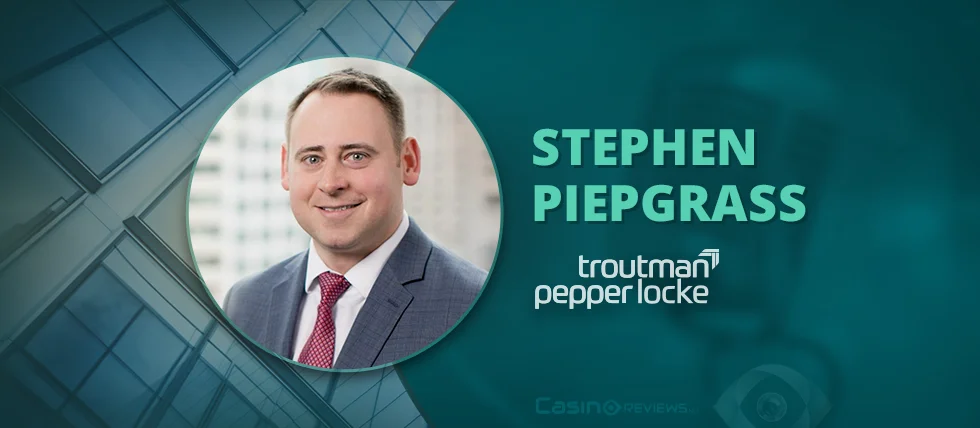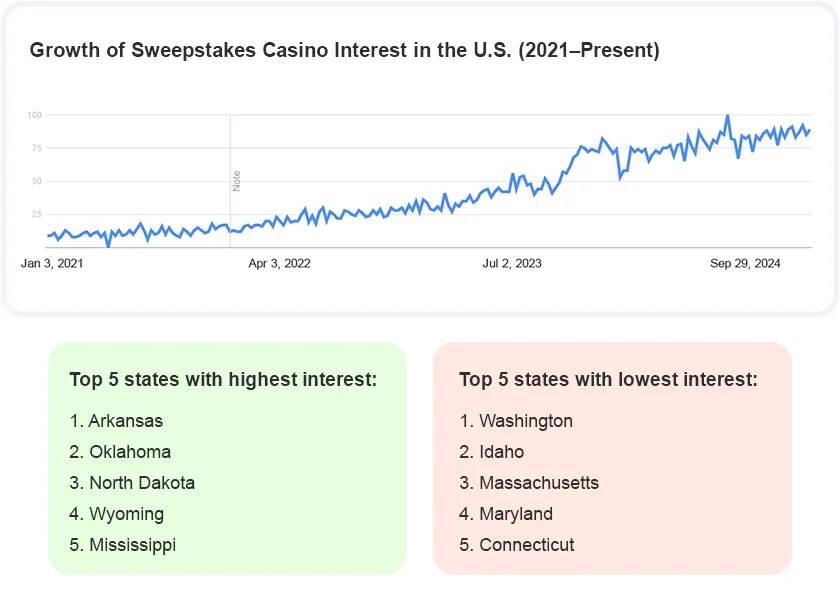Sweepstakes Casinos: Thriving in an Ever-Changing Industry – Interview with Attorney Stephen C. Piepgrass
The legal world around sweepstakes casinos is changing fast, and it’s stirring up plenty of debate among regulators, industry players, and lawmakers. As these platforms grow in popularity, so too do the class action lawsuits and legal challenges they face. This raises a critical question: can sweepstakes casinos survive the mounting legal pressure?

To dive deeper into this complicated topic, we spoke with Stephen C. Piepgrass, attorney and partner at Troutman Pepper Locke LLP, and a legal expert in regulatory investigations. In our interview, he provides valuable insights into the legal hurdles sweepstakes casinos are up against, the potential for significant industry shifts, and what the future may hold for these platforms. He also delves into the possibility of alliances and coalitions forming to shape the industry’s trajectory, offering a perspective on how collaboration could play a role in navigating these challenges. For a deeper look at his expert analysis and what it means for the future of sweepstakes casinos, keep reading.
Stephen, thank you for joining us. Could you start by telling us about your background as an attorney and how your expertise in government actions has shaped your current role?
Before going to law school, I spent three years on Capitol Hill working for different members of congress in both the House and Senate. That background prepared me to practice law with a focus on government actions. I have been practicing for 20 years and have focused for the past 17 years on regulatory investigations, and primarily those brought by State Attorneys General. I now lead a practice group of over 60 attorneys across the United States, who cover various aspects of regulatory law – from investigations, to compliance, to litigation, to government relations. Gaming fits naturally in my practice, with its constantly changing business models, complex patchwork of regulations, and close scrutiny by regulators primarily at the state level.
Diving straight into our main topic for today: the growing effort in the U.S. to regulate sweepstakes casinos. From a legal perspective, could you define what sweepstakes casinos are and explain how they differ from traditional online casinos, considering they allow users to buy currency, play, and later exchange winnings for monetary prizes?
Traditional online casinos are often referred to in the industry as “iGaming.” iGaming is online casino gaming using real money offered by entities that operate under existing licensing requirements typically associated with established brick-and-mortar casino operations. These online platforms are accessible in jurisdictions where the associated casinos are licensed. This means they have a much more limited geographic scope of operation than sweepstakes casinos. In the United States today only seven states offer iGaming. And, of course, traditional online casinos face a higher regulatory burden than sweepstakes casinos which operate outside of any established regulatory framework.
Online sweepstakes casinos, while often similar in appearance to traditional iGaming platforms, employ distinct business models that attempt to leverage free opportunities to play and sweepstakes entries to eliminate the element of consideration from the traditional three-prong test for illegal gambling (prize, chance, and consideration).
Proponents argue that sweepstake casinos do not constitute gaming, and therefore cannot be regulated like traditional gaming operations. Critics, on the other hand, assert that the free play and sweepstakes aspects of the games are simply a pretext, with the real motivation for players being the opportunity to win money or other things of real value.

The same factors that provide online sweepstakes significant competitive advantages over traditional online casinos – the opportunity to offer casino-like games where players win money and prizes without complying with complex and expensive regulatory schemes – also make sweepstakes casinos prime targets for regulatory scrutiny.
Sweepstakes casinos position themselves as 'no real money gambling sites,' though this is only partially accurate given the model they operate under. By exploiting the 'no purchase required' loophole, they’ve managed to fly under the radar for quite some time. From a legal perspective, why does this model work and allow these casinos to avoid legislation and state regulations?
As an initial matter, proponents of sweepstakes casinos would take issue with the term "loophole," and would argue that they simply are complying with laws as they are currently written. They would say that if there is a perceived gap in a regulatory framework, it is the responsibility of state legislatures to address and close it
Here is how the model works: sweepstakes casino players can use a certain type of coins for free gaming (often called “gold coins”). Gold coins are available for free or for purchase, have no monetary value, and can be used to play the casino-style games for fun and without earning any prize. Casino-style games also can be played with other coins (often called “sweeps coins”), which cannot be purchased, but which can be obtained in various other ways (welcome and log-in bonuses, contests, etc.).
When playing with sweeps coins, players can win real money and other things of value. Sweepstakes casino operators assert that because their games can be played without consideration, no gambling is taking place.
Regulators, marketplace competitors, and proponents of regulated iGaming, on the other hand, contend that the sweepstakes model is merely a façade. They assert that the true incentive for players is the potential for real monetary rewards. This debate underlies regulatory scrutiny of the online sweepstakes casino model.
It is important to note that this is not a novel debate in the gaming industry. For decades, those who seek to avoid having activities characterized as gambling and thereby avoid regulation have looked for ways around at least one of the three elements of illegal gambling – prize, chance, and consideration – to create lucrative gaming alternatives. The current sweepstakes casino model is the latest iteration of this trend, which has been enabled on a global scale in the online marketplace.
With only seven states having legalized real-money online casino gambling, sweepstakes casinos have stepped in to fill the gap. Over the past year, these platforms have boomed, with new sites emerging every day. Given the complexity and resources required to launch a fully operational online casino—such as licenses, documentation, and responsible gambling practices implementation—what are the requirements for opening a sweepstakes site? Do you believe these platforms meet established standards, and what are the standards for them actually?
So far, no jurisdiction has implemented a comprehensive regulatory framework specifically for sweepstakes games. While there have been proposals to license and regulate sweepstakes casinos (including a recent proposal in New Jersey), and proposals to ban sweepstakes games altogether, none seems to have yet gained traction.
As I noted earlier, proponents argue that they do not need to meet the same requirements as traditional online casinos because they do not consider sweepstakes casinos to offer gambling. If sweepstakes casinos are right, then unless and until legislation is passed, sweepstakes casinos simply would need to comply with the requirements for operating a sweepstakes in each of the jurisdictions where they operate (for example, offering a free method of entry, restricting participation by age, etc.). Of course, they would also need to comply with regulations generally applicable to all businesses.
I want to emphasize that last point, because it provides an important caveat to those who might believe sweepstakes casinos can operate free of regulatory scrutiny. Even if sweepstakes casinos are right that regulatory structures around gaming do not apply to them, they are still governed by state unfair and deceptive acts and practices (UDAP) laws and other consumer protection laws that apply to any industry. This means that they are subject to scrutiny in the United States by state attorneys general and other regulators using their traditional powers under current laws, who can pursue investigations of everything from advertising and marketing practices, to representations about the odds of winning various games, to the targeting of vulnerable populations.
And it is not just state UDAP laws that regulators have in their toolboxes. Regulators also are considering whether other historically overlooked laws, like the federal Unlawful Internet Gambling Enforcement Act (UIGEA), might be applied to online sweepstakes casinos and businesses that enable their activities.
The rise of sweepstakes sites and their growing user base means one major consequence: no state gaming taxes and lost revenue for the government. Do you think the government’s recent focus on these platforms is driven by concerns over societal risks—such as gambling addiction, lack of responsible gambling practices, and consumer protections—or is it primarily about the revenue they’re missing out on?
My sense is that the focus on sweepstakes casinos by regulators is driven by a combination of several factors, including those you have identified: concerns over societal harms and the potential loss of tax revenue.
It is true that online sweepstakes casino platforms operate without contributing to state gaming taxes, and this represents a significant loss of potential revenue for the states.
If states were only driven by a desire to maximize revenue, however, we would expect to see either the rapid adoption of a regulatory and taxing structure around the sweepstakes casino model, or a more widespread adoption of online casinos associated with brick-and-mortar establishments (i.e., iGaming) in states where casinos are already legal to operate. The fact that we have not seen that sort of expansion suggests that there are additional concerns at play.
These include the concerns you note about potential gambling addiction, the absence of responsible gambling practices, and the lack of consumer protections. These concerns likely give regulators pause when they consider any sort of legalization framework.
Finally, another obstacle to adoption of any legalization approach is the perception that sweepstakes casinos will compete for players’ attention with other forms of gaming, including lotteries, online fantasy sports, and traditional casinos. All these factors complicate any effort to regulate and tax online sweepstakes casinos.
In recent months, we’ve seen a surge in class action lawsuits targeting various stakeholders in the sweepstakes business—from brands like Pulsz in California to tech giants like Google and Apple, whose payment platforms are used on these sites. With these early adopters now facing legal challenges, the question is: can sweepstakes casinos and other stakeholders be legally blamed for exploiting what appears to be a significant gap in the regulatory framework? And why is this legal action happening now, during their peak profitability, rather than when these platforms first emerged?
It is not a coincidence that the surge in legal actions coincides with the financial success and visibility of these platforms. If you are a plaintiffs’ attorney, the fact that sweepstakes casinos’ profitability is increasing, necessarily means class size and potential damages also grow. This makes the growing industry an increasingly attractive target for those seeking settlements or judgments.
I do not believe, however, that we have reached peak profitability. When it comes to profits, online sweepstakes casinos appear very much to still be on the upswing.
I also will note that regulators are closely monitoring these class action lawsuits, including the legal theories being put forward. I would not be surprised to see regulatory actions follow if various legal claims in these lawsuits prove successful.
More Interviews
 Interviews
Interviews
When Helping Others Is a Life-Long Mission - An Interview with Gordon Moody CEO, Monica Shafaq
Dec 17, 2024 Interviews
Interviews
Charting a Path to Success: An Interview with Christina Muratkina, CEO of Onlyplay
Aug 21, 2024
A recent Forbes article suggests sweepstakes casinos face long legal odds and battles for survival. From a legal perspective, do you believe they can in fact survive?
Regardless of how long they survive, online sweepstakes casinos are currently an undeniably lucrative market. Given the profits involved, until one of these legal challenges succeeds in a definitive manner, this market is unlikely to shut down anytime soon. At the same time, this is an industry that is in flux.
In the long term, it is unlikely that sweepstakes casinos will continue to operate in their current form. Whether due to pressure from class action lawsuits or regulatory scrutiny, the industry is poised for change.
This should not be unexpected; in the gaming industry, the only constant has always been change. When one business model is ruled illegal by a tribunal or legislated out of existence, a new business model is developed to supplant it – often by the same operators.
Given the substantial revenue these platforms generate, it would be surprising if the industry was shut down entirely. This is particularly true in the United States, where it is likely that each state would need to take action to do so. The critical question for sweepstakes casinos interested in the long-term survival of their current business model is whether a regulatory structure can be established around these operations before the industry faces a more comprehensive crackdown.
Despite the industry's profitability and the existing regulatory gaps, we have yet to see a significant proposal or model legislation from the sweepstakes casino operators to create a regulatory structure. It will be interesting to see whether these operators propose a regulatory framework in the coming months and years – and whether such a framework can gain traction in the states.
How do you see the legal battles around sweepstakes casinos unfolding in 2025? Can you forecast what we might expect in the coming months, and could this signal major regulatory shifts?
In 2025, we can anticipate a continuation of class action lawsuits targeting sweepstakes casinos, alongside increasing involvement from regulators. As I mentioned, it is safe to assume that regulators are closely following these lawsuits, which offer an early test of legal theories that regulators interested in taking action might seek to apply.
With respect to regulatory activity, while investigations are typically confidential, it would be surprising if these platforms were not already under some regulatory scrutiny. Areas of inquiry are likely to focus on basic questions about the business model, like whether the element of consideration is present, as well as other concerns arising from the unregulated nature of these operations.
To the latter point, I would not be surprised if regulators look into the potential for manipulation of odds, the use of technology like AI to encourage players to play longer, thereby creating problem gamblers, any marketing targeted to vulnerable populations. Put another way, areas ripe for inquiry would be those that current regulatory frameworks for traditional gaming seek to address.
At this point, there are two clear sides: sweepstakes casinos and those opposing them. Legally speaking, what do you think is the best course of action for opponents—such as the AGA, state lawmakers, and other authorities? Will relying on frameworks like the Unlawful Internet Gambling Enforcement Act (UIGEA) be enough to succeed?
For opponents of sweepstakes casinos, the most effective course of action is to leverage existing legal frameworks and regulatory tools to initiate investigations or actions against market participants whose operations are deemed undesirable.
This is a playbook executed many times in many different industries. The strategy includes examining state consumer protection laws, advertising and marketing prohibitions, and other relevant statutes and regulations, including UIGEA, to identify and exploit potential legal hooks to launch investigations or regulatory actions.
Opponents may also look to leverage other regulated stakeholders and their beneficiaries to create a coalition to pressure regulators and policymakers to take action. Allies could include everyone from brick-and-mortar casinos, to horse racing, to online sports wagering businesses, to charitable gaming operations, to lotteries, to local governments and native American tribes that benefit from casinos and iGaming in their jurisdictions.
On the other side, what do you believe is the best move for sweepstakes to protect themselves in this legal battle?
For sweepstakes casinos to protect themselves, they should consider proactively proposing an industry standard or a model regulatory framework. This framework should address, to the extent possible, many of the criticisms and allegations raised by opponents and in class action complaints. By doing so, sweepstakes operators would look to demonstrate a commitment to operating openly and legally, in a manner that is above reproach. This approach not only helps to mitigate legal risks but also positions the industry as a responsible and cooperative participant in the broader gaming landscape.
Additionally, I would suggest pairing the effort with a tax structure that can be used to create a financial incentive for lawmakers and the public to support the proposed framework, thereby aligning the interests of the industry with those of the state.
If you had to choose a side based purely on the law, without considering morality, which side do you think would win?
It is likely that the current model of sweepstakes casinos will face significant challenges and may not survive long-term in its present form. If these casinos are unable to establish their own regulatory structure, eventually they will be put out of business by a combination of class action lawsuits and regulatory actions against not only the sweepstakes operators, but also against those that provide the platforms that enable them to continue operating. This process will take time, and the business model is likely to evolve in response to these legal pressures.
The industry’s best chance to survive for the long haul would be to develop and advocate for a regulatory framework that addresses, to the degree possible, the concerns of opponents that we have just discussed.
One somewhat “outside the box” idea would be for stakeholders in the sweepstakes casino business to enter into a dialogue with iGaming proponents. Support the expansion of iGaming in states that already have casinos, in return for support from traditional online casinos for adoption of a regulatory framework allowing sweepstakes casinos to operate legally and be taxed in states that do not.
Whether a trade-off like that might be possible in the real world remains to be seen.
While we’ve focused on sweepstakes casinos, traditional real-money online casinos are also impacted by this. What steps should they take to protect their interests in this evolving and uncertain landscape?
For traditional real-money online casinos, one effective strategy may be to advocate for the expansion of iGaming in states where brick-and-mortar casinos already exist. iGaming operators should be able to effectively argue for a comprehensive regulatory structure that not only allows them to operate, but also eliminates competition from those who are now operating without restrictions.
Traditional online casinos also should proactively engage with regulators and legislators in their respective states to advance their view that the uneven playing field created by the current regulatory environment, which allows virtually unfettered operation by sweepstakes casinos, is not just bad public policy, but risks harming consumers. Such a message would have the greatest strength if it is reinforced by a coalition that includes others in the regulated gaming space, who I discussed earlier.
We at CasinoReviews thank Stephen for sharing his insights and shedding light on the complex legal challenges facing sweepstakes casinos. As the battle over these platforms continues to unfold it remains clear that the legal and regulatory landscape is in constant flux. Whether through lawsuits or policy changes, the future of sweepstakes casinos remains uncertain. Stephen’s analysis highlights the potential for alliances, regulatory frameworks, and even unexpected partnerships to shape the industry’s trajectory. But with mounting legal scrutiny and competing interests on both sides, the question of whether sweepstakes casinos can adapt and survive remains unanswered.
Stay tuned to our interview series for more expert perspectives from industry leaders navigating the ever-changing world of online gaming.
RELATED TOPICS: Interviews
Most Read
Must Read
 Interviews
Interviews
When Helping Others Is a Life-Long Mission - An Interview with Gordon Moody CEO, Monica Shafaq
Dec 17, 2024 Interviews
Interviews







Review this New Post
Leave a Comment
User Comments
Comments for Sweepstakes Casinos: Thriving in an Ever-Changing Industry – Interview with Attorney Stephen C. Piepgrass